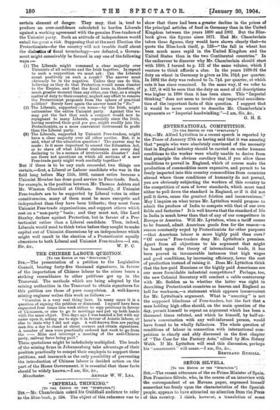[INTERNATIONAL COMPETITION.
[TO THE EDITOR OF TDB "SPECTATOR."]
SIR,—Mr. Alfred Lyttelton in a recent speech is reported by the Times of January 27th as having said that it was amazing that "people who were absolutely convinced of the necessity that in England industry should be carried on under humane conditions to the worker were wholly unable to derive from that principle the obvious corollary that, if you allow these conditions to prevail in England, which of course make the production of commodities more expensive, and permit to be freely imported into this country commodities from countries abroad where those conditions of humanity do not prevail, you are obviously subjecting the workers of, this country to the competition of men of lower standards, which must tend either to pull down the standard in -England, or if it did not pull it down, cause the greatest friction and inconvenience.',' May I inquire on what terms Mr. Lyttelton would propose to admit the produce of India to compete with that of our own fields and factories ? It is well known that the standard of life in India is much lower than that of any of our competitors in Europe or America. Will Mr. Lyttelton, when a tariff comes to be framed, admit American goods free for the reason—a reason constantly urged by Protectionists for other purposes —that American labour is more highly paid than ours ? "Of course" Free-traders deny Mr. Lyttelton's premises. Apart from all objections to his argument that might be based upon the theory of international trade, it has been proved in innumerable instances that high Wages and good conditions, by increasing efficiency, lower the cost of production instead of raising it. Does Mr. Lyttelton think that the low-paid Russians or the highly paid Americans are our more formidable industrial competitors ? Perhaps, too, the new Colonial Secretary will conduct a cable controversy with Mr. Seddon as to whether the latter was right in describing Protectionist countries as heaven and England as hell for workmen,—a statement which appears inconvenient for Mr. Lyttelton's argument. What is " amazing " is not the supposed blindness of Free-traders, but the fact that 'a man: holding high office should, on the main question of the day, permit himself to repeat an argument which has been a thousand times refuted, and which he himself, by half-an- hour's conversation with any well-informed person, would have found to be wholly fallacious. The whole question. of conditions of labour in connection with international com- petition is clearly and ably discussed in the first chapter of "The Case for the Factory Acts," edited by Mrs. Sidney; Webb. If Mr. Lyttelton will read this discussion, perhaps
his " amazement " will cease —I am, Sir, &c., -
BERTRAND RUSSELL.






















































 Previous page
Previous page